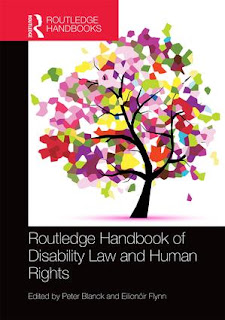I am honoured to have an article published in the Routledge Handbook of Disability Law and Human Rights, along with contributions from other well-known academics specialising in disability rights, finally out now.
Constantin Cojocariu - Hit and Miss: Procedural Accommodations Ensuring the Effective Access of People with Mental Disabilities to the European Court of Human Rights
Here is the introduction of the article:
Persons with mental
disabilities in Eastern Europe suffer
from high and well-documented rates of discrimination and abuse, which are
often embedded in the law. Phenomena such as large-scale institutionalization or
denial of legal capacity are frequently described as benevolent measures aimed
at ensuring the welfare of those concerned. The advent of the UN Convention on
the Rights of Persons with Disabilities (hereinafter referred to as the ‘CRPD’),
widely ratified across Europe, highlighted these structural inequities and
framed them as violations of basic human rights. The European Court of Human
Rights (“hereinafter referred to as ‘the Court’), as the preeminent regional
mechanism for human rights protection, would appear to hold great potential for
those seeking to challenge the status quo and achieve systemic change. However,
its output on disability rights to date has been quite limited and rather
disappointing. The physical, social and economic barriers that hinder access to
justice at all levels of the judicial system may at least partially explain this
dearth of jurisprudence. At the same time, many disability cases that do reach
the Court are dismissed on admissibility grounds, revealing a lack of
comprehension on the part of the Strasbourg judges of the specificity of
disability rights claims, or result in judgments that often replicate and
legitimize the oppressive narratives and structural discrimination that are prevalent
at the national level.
A close inspection of the Court’s jurisprudence reveals how procedural devices
such as “standing”, “material scope”, “legal representation”, “margin of
appreciation”, “exhaustion of domestic remedies” have been used to render
disability claims non-justiciable under the European Convention on Human Rights
(hereinafter “the Convention”).
This article
examines recent jurisprudential developments on disability rights in an attempt
to decipher whether disabled people benefit from “practical and effective”
access to the Court. The relevant reference point is Article 13 of the CRPD on access
to justice, which requires States Parties to “ensure effective access to
justice for persons with disabilities on an equal basis with others, including
through the provision of procedural […] accommodations, in order to facilitate
their effective role […] in all legal proceedings.” For its part, the Court has
also emphasized that “special procedural safeguards may prove called for in
order to protect the interests of persons who, on account of their mental
disabilities, are not fully capable of acting for themselves.” This article offers a practitioner’s perspective, based on the author’s
ten-year experience of litigating high profile disability cases before the Court.
The first part
of the article examines the concept of
“de facto representation” introduced for the first time recently in the
case Câmpeanu v. Romania, and its potential
implications for proxies seeking to introduce complaints on behalf of people
with disabilities suffering from abuse, lacking relatives or other guardians
and who are unable to instruct a lawyer. The second part of the article
explores the manner in which the Court deals with disabled applicants unable to
secure adequate legal representation. The Court’s practice in this respect has
been quite diverse, revealing a deeper ambivalence in its jurisprudence towards
measures that interfere with a person’s legal capacity in the form of partial
or plenary guardianship. Finally, the last part looks more closely at some of
the recent changes in the Court’s procedure, and in particular the ongoing move
to tighten as well as enforce more strictly the admissibility criteria for
individual petitions, likely to have a disproportionate impact on disabled applicants.

No comments:
Post a Comment